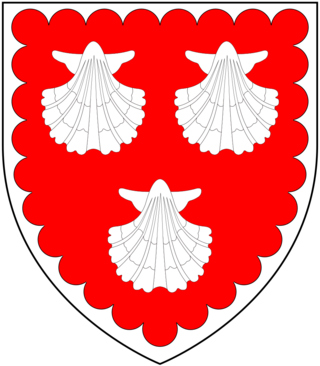Related Research Articles

Lathom House was a large country house in the parish of Lathom in Lancashire, England. Built between 1725 and 1740, the main block was demolished in 1925.

Sir John Borlase, 1st Baronet of Bockmer, Medmenham, Buckinghamshire was an English politician who sat in the House of Commons between 1640 and 1644. He supported the Royalist cause in the English Civil War.

Sir John Glynne KS was a Welsh lawyer of the Commonwealth and Restoration periods, who rose to become Lord Chief Justice of the Upper Bench, under Oliver Cromwell. He sat in the House of Commons at various times between 1640 and 1660.

Sir John Glanville the younger, was an English politician who sat in the House of Commons at various times between 1614 and 1644. He was Speaker of the English House of Commons during the Short Parliament. He supported the Royalist cause in the English Civil War.

Sir Francis Wortley, 1st Baronet (1591–1652) was an English poet and politician who sat in the House of Commons between 1624 and 1626. He supported the Royalist cause in the English Civil War.

Sir Walter Erle or Earle was an English landowner and politician who sat in the House of Commons at various times between 1614 and 1648. He was a vigorous opponent of King Charles I in the Parliamentary cause both before and during the English Civil War.
Edward Bagshaw the elder was an English writer and politician who sat in the House of Commons from 1640 to 1644. He supported the Royalist cause in the English Civil War.
Sir Henry Berkeley (1579–1667) was an English politician who sat in the House of Commons variously between 1626 and 1640. He supported the Royalist side in the English Civil War
Charles Berkeley, 2nd Viscount Fitzhardinge was an English politician who sat in the House of Commons at various times between 1621 and 1668. He supported the Royalist cause in the English Civil War. He succeeded by special remainder to the peerage of his son who predeceased him.

Nicholas Kendall was an English politician who sat in the House of Commons in 1625 and 1640. He was killed in action fighting on the Royalist side in the English Civil War.
William Chadwell was an English lawyer and politician who sat in the House of Commons between 1640 and 1644. He supported the Royalist cause in the English Civil War.
Sir John Jacob, 1st Baronet of Bromley, was an English politician who sat in the House of Commons in 1640 and 1641. He supported the Royalist side in the English Civil War.
Sir Richard Harrison was an English politician who sat in the House of Commons variously between 1621 and 1640. He supported the Royalist side in the English Civil War.
John Bingham (1613–1673) was an English politician who sat in the House of Commons between 1645 and 1659. He served in the Parliamentary army in the English Civil War.

Sir Sampson Eure was an English lawyer and politician who sat in the House of Commons at various times between 1621 and 1643. He supported the Royalist cause in the English Civil War.
Sir Henry Anderson (1582–1659) was an English Royalist landowner and politician who represented Newcastle-upon-Tyne once as Mayor and twice as MP in the House of Commons between 1614 and 1643 and was also High Sheriff of Northumberland.
William Herbert (1621–1646) was an English politician who sat in the House of Commons from 1640 to 1644. He supported the Royalist cause in the English Civil War
John Harington (1627–1700) was an English politician who sat in the House of Commons from 1654. He fought in the Parliamentary army in the English Civil War.
Sir Edward Bishopp, 2nd Baronet was an English politician who sat in the House of Commons in 1626 and in 1640. He supported the Royalist cause in the English Civil War.
Sir William Tyringham (1618–1685) was an English politician who sat in the House of Commons from 1660 to 1679. He fought in the Royalist army in the English Civil War.
References
- 1 2 3 'Townships: Leyland', A History of the County of Lancaster: Volume 6 (1911), pp. 10–17. Date accessed: 6 July 2011
- 1 2 3 William Duncombe Pink, Alfred B. Beaven The parliamentary representation of Lancashire, (county and borough), 1258-1885, with biographical and genealogical notices of the members, &c. (1889)
- ↑ Willis, Browne (1750). Notitia Parliamentaria, Part II: A Series or Lists of the Representatives in the several Parliaments held from the Reformation 1541, to the Restoration 1660 ... London. pp. 229–239.
- ↑ 'Alumni Oxonienses, 1500-1714: Faber-Flood', Alumni Oxonienses 1500-1714: Abannan-Kyte (1891), pp. 480–509. Date accessed: 6 July 2011
- ↑ "Farrington, William (FRNN628W)". A Cambridge Alumni Database. University of Cambridge.